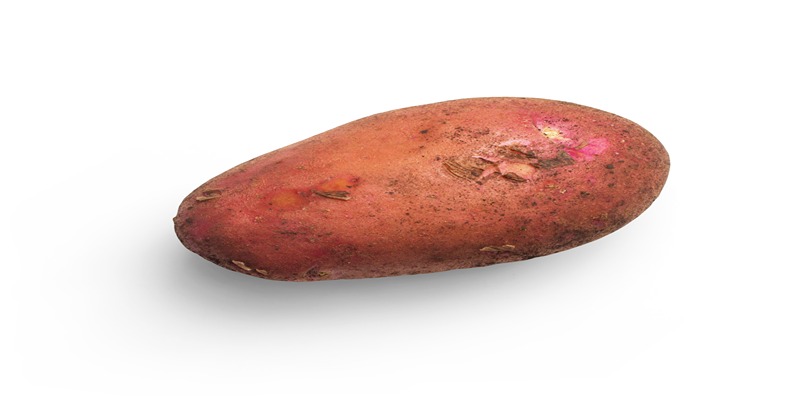Advertisement
The Nutritional Richness and Health Benefits of Potatoes
Dec 02, 2023 By Madison Evans
Potatoes are an essential part of many different diets because of their widespread esteem as a staple food. A wide variety of vitamins, minerals, and macronutrients are included in their nutritional profile. The article highlights the health advantages of potatoes by explaining their whole nutritional makeup. Carbohydrates, the main source of energy in potatoes, also include dietary fiber, which is essential for maintaining good digestive health. Vitamins C and B6, which are plentiful in potatoes, are essential for metabolism and immunity. Heart health is aided by minerals such as magnesium and potassium. The nutritional core of potatoes helps us understand their position in a balanced diet, which makes them a varied and healthy dietary option.

Potato Nutrition Analysis: A Closer Look
Macronutrients in Potatoes
Potatoes, primarily known for their carbohydrate content, serve as a significant source of energy in various diets. Each serving contains starch, a complex carbohydrate, facilitating a slow, consistent release of energy. This characteristic helps in maintaining stable blood glucose levels. Beyond carbohydrates, potatoes possess proteins, albeit in modest amounts, contributing essential amino acids. The fat content in potatoes is minimal, making them a low-fat option for those monitoring their fat intake.
Vitamins, Minerals, and Fiber Content
The vitamin and mineral profile of potatoes is impressively diverse. Rich in vitamin C, potatoes aid in immunity enhancement and skin health. Vitamin B6, pivotal in neurotransmitter synthesis and homocysteine regulation, is another key component. Potatoes are a treasure trove of potassium, surpassing even bananas in some varieties, which benefit heart health by regulating blood pressure. Magnesium and iron, present in notable amounts, support overall bodily functions. Additionally, the dietary fiber in potatoes, particularly in their skin, promotes digestive health and aids in maintaining a feeling of satiety.
Comparison with Other Staple Foods
When juxtaposed with other staple foods like rice and wheat, potatoes offer a unique nutritional composition. While rice and wheat are higher in calories and protein, potatoes excel in vitamin and mineral content, especially vitamin C and potassium. The glycemic index of potatoes is higher than that of whole grains, which might impact blood sugar levels differently. However, the method of preparation can significantly affect this aspect. In terms of fiber, whole grains typically have an edge over potatoes unless the potatoes are consumed with their skin. Overall, potatoes stand out for their vitamin and mineral richness, offering a healthful alternative or complement to other staple foods in a balanced diet.
Health Advantages of Potatoes
Role in Heart Health
Potatoes contribute significantly to heart health, primarily through their potassium content. Potassium, an essential mineral, assists in lowering blood pressure by counteracting the effects of sodium. Regular consumption of potassium-rich foods like potatoes can aid in maintaining optimal blood pressure levels, a key factor in heart health. Additionally, the fiber in potatoes plays a role in cholesterol management. Soluble fiber can help reduce the absorption of cholesterol into the bloodstream, thereby potentially lowering levels of low-density lipoprotein (LDL), often termed bad cholesterol. Moreover, the vitamin C and B6 content in potatoes supports the structural integrity of blood vessels and reduces the risk of heart disease.

Potatoes and Blood Sugar Management
Potatoes have a significant impact on blood sugar management, though this is complex and dependent on various factors. The glycemic index (GI) of potatoes is generally high, which can cause a rapid increase in blood sugar levels. However, the actual effect on blood sugar can vary based on the type of potato, cooking method, and what it is consumed with. Eating potatoes with a source of protein or healthy fat can lower their glycemic load, moderating their impact on blood sugar. Moreover, the resistant starch in cooled potatoes (like in potato salad) can improve insulin sensitivity, thus aiding in blood sugar regulation.
Benefits for Digestive Health
Potatoes are a beneficial component for digestive health, primarily due to their fiber content. The fiber in potatoes, especially when eaten with the skin, aids in promoting regular bowel movements and preventing constipation. This dietary fiber can also act as a prebiotic, feeding the beneficial bacteria in the gut, which is crucial for overall gut health. Additionally, this fiber contributes to a feeling of fullness, which can aid in weight management, an aspect beneficial for overall digestive health and general well-being.
Nutritious Potato Facts: Myths and Truths
Debunking Common Misconceptions About Potatoes
A prevalent myth suggests that potatoes are fattening and contribute to weight gain. This misconception often stems from the high-calorie preparations of potatoes, such as frying. In their natural form, potatoes are low in calories and fat. Another common fallacy is that potatoes lack nutritional value. Contrary to this belief, potatoes are a rich source of vitamins, minerals, and fiber, making them a healthful addition to any diet.
Scientific Truths About Potato Nutrients
Potatoes are nutritionally dense, offering a variety of essential nutrients. They are an excellent source of vitamin C, crucial for immunity and skin health. Vitamin B6 in potatoes aids in neurotransmitter synthesis and metabolic processes. Potatoes are also rich in potassium, surpassing many other fruits and vegetables, which help in regulating blood pressure and heart health. The fiber content, especially in potato skins, is beneficial for digestive health and can aid in cholesterol management.
Impact on Overall Health
The impact of potatoes on health is multifaceted. Firstly, they provide energy in the form of carbohydrates, which are essential for various bodily functions. The fiber in potatoes aids in digestive health and can contribute to a feeling of fullness, aiding in weight management. Potatoes' potassium content plays a critical role in cardiovascular health. However, it's important to note that the method of preparation significantly influences the health benefits of potatoes. Baked, boiled, or steamed potatoes retain most of their nutrients and are healthier options compared to fried potatoes. Additionally, combining potatoes with a balanced diet and healthy lifestyle amplifies their positive impact on overall health.
Incorporating Potatoes in a Healthy Diet
Healthy Ways to Prepare and Consume Potatoes
When eaten and cooked in a manner that doesn't compromise nutrition, potatoes may be a tasty and satisfying part of a healthy diet. One tasty and healthy way to cook potatoes is with a little olive oil and herbs, either baked or roasted. Reduce the calorie content of potatoes without sacrificing any of their key nutrients by boiling or steaming them. Instead of using sugar, try using sweet potatoes, which are quite similar to ordinary potatoes but have more nutrients and a naturally sweet flavor. In order to cut down on calories and fat without sacrificing flavor or texture, try mashing potatoes with Greek yogurt or partially substituting potatoes with cauliflower.
Balancing Potato Intake with Other Food Groups
Making sure your potato consumption is balanced with other food groups is vital for a well-rounded lunch. To boost the meal's nutritional worth, try serving potatoes with lean meats like grilled chicken or tofu. A wide spectrum of vitamins and minerals may be achieved by including a variety of vegetables with potatoes. As a source of complex carbs and extra fiber, whole grains like quinoa or brown rice go well with potatoes. When including potatoes in your diet, it's important to watch portion management and keep track of total calories. You may keep to a healthy diet while enjoying the distinct tastes and advantages of potatoes by mixing them with other nutrient-rich foods.
Conclusion
Potatoes, which are often misunderstood, should be praised for the important role they play in nutrition and general well-being. A well-balanced diet may benefit from consuming these adaptable tubers since they contain a variety of critical elements, including minerals, vitamins, and fiber. By clearing up common myths and using better cooking techniques, people may enjoy potatoes without sacrificing their health. Potatoes may greatly benefit heart health, digestive health, and general vigor when they are carefully included in meals with other different food groups. Let us rejoice in the fact that potatoes are a healthy food option and appreciate them for what they are: nourishing.







